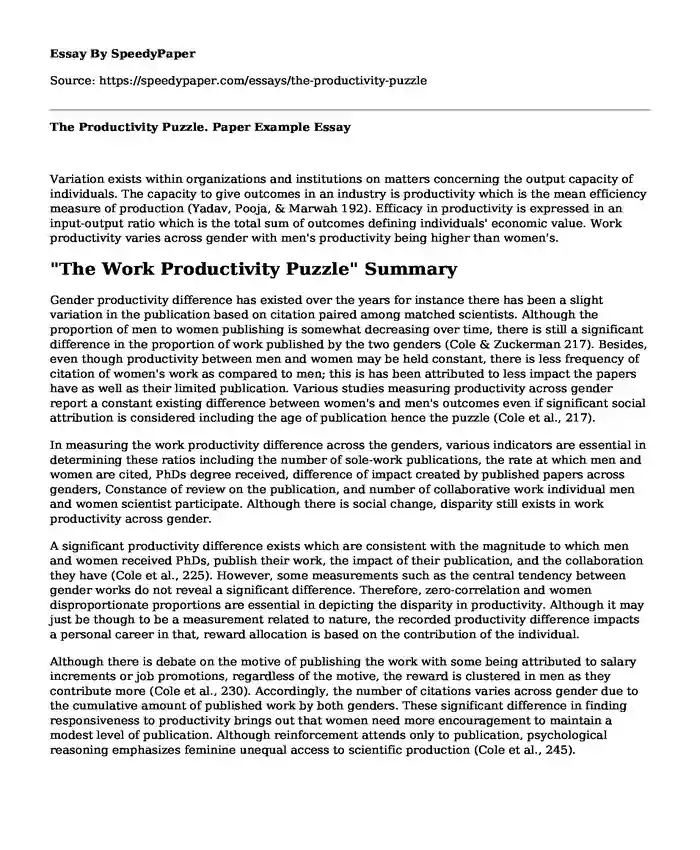
| Type of paper: | Term paper |
| Categories: | Gender Human resources Motivation |
| Pages: | 4 |
| Wordcount: | 829 words |
Variation exists within organizations and institutions on matters concerning the output capacity of individuals. The capacity to give outcomes in an industry is productivity which is the mean efficiency measure of production (Yadav, Pooja, & Marwah 192). Efficacy in productivity is expressed in an input-output ratio which is the total sum of outcomes defining individuals' economic value. Work productivity varies across gender with men's productivity being higher than women's.
"The Work Productivity Puzzle" Summary
Gender productivity difference has existed over the years for instance there has been a slight variation in the publication based on citation paired among matched scientists. Although the proportion of men to women publishing is somewhat decreasing over time, there is still a significant difference in the proportion of work published by the two genders (Cole & Zuckerman 217). Besides, even though productivity between men and women may be held constant, there is less frequency of citation of women's work as compared to men; this is has been attributed to less impact the papers have as well as their limited publication. Various studies measuring productivity across gender report a constant existing difference between women's and men's outcomes even if significant social attribution is considered including the age of publication hence the puzzle (Cole et al., 217).
In measuring the work productivity difference across the genders, various indicators are essential in determining these ratios including the number of sole-work publications, the rate at which men and women are cited, PhDs degree received, difference of impact created by published papers across genders, Constance of review on the publication, and number of collaborative work individual men and women scientist participate. Although there is social change, disparity still exists in work productivity across gender.
A significant productivity difference exists which are consistent with the magnitude to which men and women received PhDs, publish their work, the impact of their publication, and the collaboration they have (Cole et al., 225). However, some measurements such as the central tendency between gender works do not reveal a significant difference. Therefore, zero-correlation and women disproportionate proportions are essential in depicting the disparity in productivity. Although it may just be though to be a measurement related to nature, the recorded productivity difference impacts a personal career in that, reward allocation is based on the contribution of the individual.
Although there is debate on the motive of publishing the work with some being attributed to salary increments or job promotions, regardless of the motive, the reward is clustered in men as they contribute more (Cole et al., 230). Accordingly, the number of citations varies across gender due to the cumulative amount of published work by both genders. These significant difference in finding responsiveness to productivity brings out that women need more encouragement to maintain a modest level of publication. Although reinforcement attends only to publication, psychological reasoning emphasizes feminine unequal access to scientific production (Cole et al., 245).
Increasing Work Productivity in Vicksburg
Productivity can be pursued through government-implemented policy at a national level. Through the development of labor regulation, universal education, infrastructure and improvement of trade relations, companies and individual productivity will increase in Vicksburg (Stephens, Pamela, & Sarah Treuhaft 2). Low productivity is a consequence of limitation in funding in education and infrastructure which eventually lower revenue.
Since both local and national governments are responsible for initiating implementation within the society, adopting a flexible way in Vicksburg, especially in program implementation will increase productivity. The productivity of Vicksburg has been low because of the low unemployment rate, especially for women who live beyond the poverty line (Stephens et al., 2).
Although individuals have great educational attainment, high unemployment still crowds Mississippi. To be able to achieve higher productivity in Vicksburg one of the cities in Mississippi, local and national government should gear upon seeing that gender biases and racial segregation is eradicated. Although there are few women and colored individuals working full time, they are concentrated in less rewarding work. Although there is an attempt to address the barrier towards low productivity such as the formation of the Workforce Innovation and Opportunity Act (WIOA), there is a major barrier existing (absence of childcare that is affordable) restricting work productivity in individuals (Stephens et al., 2). Therefore, government investment in women will significantly address the Vicksburg workforce dispute which will, in turn, increased productivity. Additionally, Mississippians' productivity will increase through agenda programs from the government that will link them to good jobs.
Work Cited
Cole, J. R., and H. Zuckerman. "The Productivity Puzzle: Persistence and Change in Patterns of Publication Among Men and Women Scientists In Steinkamp, MW, Maehr, M.(Eds.): Advances in Motivation and Achievement." (1984). https://www.researchgate.net/profile/Jonathan_Cole13/publication/304109111_The_Productivity_Puzzle/links/57961df408aec89db7b84cc0/The-Productivity-Puzzle.pdf
Yadav, Pooja, and S. Marwah. "The concept of productivity." International Journal of Engineering and Technical Research (IJETR) 3.5 (2015): 192-196. https://pdfs.semanticscholar.org/1514/f4aae0207bd2cfe5305604662b7f1f2e34a5.pdf
Stephens, Pamela, and Sarah Treuhaft. "Boosting Economic Growth in Mississippi through Employment Equity." (2018). https://nationalequityatlas.org/sites/default/files/EmploymentEquityMississippi_05_18_18.pdf
Cite this page
The Productivity Puzzle. Paper Example. (2023, Apr 05). Retrieved from https://speedypaper.com/essays/the-productivity-puzzle
Request Removal
If you are the original author of this essay and no longer wish to have it published on the SpeedyPaper website, please click below to request its removal:
- Thesis Paper Example: Four Forces Leveraging Cash Flow of a Company
- Is a College Degree Worth It? Education Essay Sample
- Date The Nether by Jennifer Haley
- Essay Example: Privacy, Consent, and Confidentiality Issues in Biomedical and Biological Research
- Export Strategy Essay Sample from Our Database
- Medical Law Essay Example: Patient Confidentiality
- Essay Sample on Plastic Usage as a Social Problem
Popular categories




